#only for Sinclair to learn that replacing someones entire body is likely. really against the law in sumeru. it would be funny for him.
Explore tagged Tumblr posts
Text
I keep dreaming up Limbus Company sinner gets isekaid into Genshin Impact AUs
I sadly don't have the full set of 12 plotted yet, but I've started designing the ones I'm invested in.
Everyone having locations and then casually dropping that Outis is in the Arataki Gang. Give the old woman a gun again. She deserves it. ❤️
I also think she would get along with Shinobu.
It would be an entire lore dump on their general isekai'd lifestyle, their new social circle, if they share their history, and the possibility of them using specific weapons or visions. (Some characters have notes on skill/burst/idle animations)
Currently I am drawing each character with a basic weapon that is either tied any WAW egos a character has or an item that is related to their backstory.
#Limbus Company#please tell me if i shouldn't main tag lolol#i find it fun to plot so many individual aus-- and it helps me think about different aspects of a character's personality#ive been on the Rodya Appreciation Train���️ for the past week and it's really refreshing to think about her in a new environment#just... character traumas could show in such unique ways.#the limbus cast wouldnt be stuck in the city where corporations rule the people and the poor is seen as fodder.#teyvat would literally be heaven compared to the city#Ishmael casually watching Arlecchino stomp in a guys head yeah its gross but its nothing compared to the pallad whale. or the lake mermaids.#Outis living in the daily hijinks of the Arataki Gang and learning to be a normal human being#outis having to get over her war traumas and learn to actually trust people. she gets a healing arc#i honestly think don might be the only one who would actively talk about her home world#none of the others really have anything... great to say.#Rodion might tell people but it would be moreso a threat. she shows that shes done worse. shes delt with worse.#anyways i almost put sinclair in sumeru becaue i thought it would be funny for the pathetic boy to have his prosthetic studies be used#only for Sinclair to learn that replacing someones entire body is likely. really against the law in sumeru. it would be funny for him.#but in the end sinclair is a little german guy. and the hilarious thought of him performing maracas in Diluc's bar won.
8 notes
·
View notes
Note
Can we get a Sinclair brothers with a strong headed feminist s/o where she’s like “I don’t need no man but they are like Daddy and she loses it and turns into putty in their hands”
this is kind of ironic because the dictionary translation of “turning putty in someone’s hands” is “turning to wax in the hands/presence of someone” in my language lmao
anyways, i only wrote this for bo so far. i couldn’t really find the motivation to write the past few days (which fucking s u c k s), but i will definitely upload another one for vincent (i’m just assuming this was meant for the twins??)
SATISFACTION [Bo Sinclair]
Bo Sinclair was a charmer. A man with good manners, quite the flirt, but never disrespectful without a reason. An old-fashioned, well-raised man. A sweet talker. The man of every girl’s dreams, if you will, as if someone took him right out of a romance picture book. He could make every girl blush. He took every chance he got to make a girl a compliment, oh, how pretty all the women were he talked to, at least that’s what he told them. How pretty and smart and sweet they were. He’d call them ‘darling’ or ‘sweetheart’, bringing a smile to every each of their faces.
Bo Sinclair was also an asshole. He was one of those people who know exactly what to do and say to get what they want, and he did and said things only for his own profit. And when he did so he never felt just the tiniest bit of guilt. No, Bo Sinclair didn’t care that the girls would go to sleep that night, dreaming about his alluring words, charming smile and handsome face. He didn’t care at all, as long as he got what he wanted. What he wanted was something else, always, but it perpetually was something he’d gain from.
You hated both sides of Bo. The charmer and the asshole, you despised them equally. When you had met Bo, he had complimented you, told you how beautiful you looked, how talented you were. Whenever he said something like this he wore the same kind of smile on his face. Flirtatious, but knowing. Yes, he knew what this smile could do to a girl. But not to you. You had rolled your eyes the first time, the second time, even the third time, but your patience wasn’t endless and at some point you had spat in his face that you’d rather have him shut his mouth, that you didn’t care for his opinion on whatever you did. No, you didn’t care what Bo Sinclair had to say about you, you knew your worth. You really did. You knew there was nothing he could give you that you couldn’t get yourself. And you learned that this was true, indeed, except for satisfaction. Pleasure. Of what kind, you didn’t know. Maybe you wanted his sweet talking to be true. Maybe you wanted to wake up to that smile in the morning, the first words you’d hear being ‘good morning, beautiful’. Maybe you just wanted to get fucked hard. Either way, you didn’t like it. And now here you were, right in front of the gas station, telling him quite loudly that you were very much capable of carrying a brimful box of tools for god-knows-what. “Get the fuck out of my way, I don’t need your fucking help. You don’t get it, do you? I don’t need your help at all.” Ironically you let the box fall, but only to point your finger at his chest. “All I want is for you to get out of my way. Stop bothering me for fuck’s sake!” Bo only smirked, like you knew he would. God, you hated that smirk so much. But if you knew he would react that way, why did you give him the satisfaction? “No need to get all noisy, darlin’. No need to get so upset.” “Of course I’m upset. You annoy the shit out of me. That behavior? It’s going to kill me!” A quiet chuckle left his lips and he took a step closer to you. “Never meant to bother you, sweetheart. You seem to be passionate about hatin’ me though.” The smirk didn’t leave his lips. It was as if he knew what he did to you. As if he knew you wanted him, but how much you hated yourself for it. “Yeah, it’s because you seem to be very passionate about killing every last of my nerves,” you scoffed. “No, no, no. I’m just tryna be nice. Courtesy; bein’ a gentleman and all.” He was even closer to you now. He kneeled in front of you and picked up the box you had dropped earlier. Without saying anything he walked inside the gas station, box in his hand, smirk on his lips, keeping eye contact with you while he walked. You followed, getting angrier with every second passing. That was just ignorant. He set the box down on a table and turned around. You were as ready as ever to throw whatever comment seemed fitting at him, but somehow you failed. He was close, so close, and the smirk was gone. It was replaced by a smile, which you couldn’t quite place, and a serious look in his eyes, with a hint of playfulness. “I’m waitin’ for your comeback, darlin’. Come on, say somethin’.” Although the smirk was gone you knew he wasn’t enjoying this any less than before. You were fueled by rage when he brushed your hair behind your ear. How dare he? His hand was resting on your neck, softly caressing your skin with his thumb. “You’re so angry, babygirl, just calm down.” You were thinking so hard about a comeback, something, anything, to say to him. To not let him win, but you couldn’t come up with any one thing. You were blinded by your anger and didn’t see it coming. But you felt it. His lips were on yours, the taste of cigarettes on your tongue. His hands were on your hips, moving slowly to your ass and then back to were they first rested. And then they moved in the other direction, between your legs, dangerously close to your heat, but never actually touching you there. It was a lot. A lot of things happening at the same time; a lot of thoughts on your mind. You didn’t know how to react. Your body did it for you. You kissed back without thinking about it. You were unable to.
You felt just as angry as before, but there was something else too, another feeling. You couldn’t place it. But you knew this wasn’t what you had fought for. You hadn’t gone through so many screaming matches with Bo, only to give in. You forcefully pushed him away and he stumbled back, irritated, but not actually surprised. “What the fuck was that, Sinclair?” The look on his face was unreadable and his words weren’t actually helping. “I think you know. This takes two people, doesn’t it?” Scoffing you shaked your head. “I was just...confused.” “Maybe you let your feelin’s decide for once, not your pride.” You were baffled. Sure, you knew why you reacted to him the way you did, but it was something else when he said out loud. You didn’t know what to say, so you said nothing. And when he walked closer to you again, when he grabbed your hips, pulled you close to him, pressed his lips to yours, you let him. You let him do it all. And you kissed back, melted in his arms. You finally gave in. You felt guilty, as if you had betrayed someone and you did. You had betrayed yourself. But fuck, it felt so good. Wrapping your arms around his neck you pressed your body against his. And when you completely forgot about yourself, when you were lost in the kiss entirely, the only thing on your mind his taste, and the feeling of his hands, one still resting on your hip, the other now on your neck, it was then that he broke the kiss. You wanted to cry out, you even almost did. But he didn’t move his head, he only dragged yours to the side a little, his mouth right next to your ear. His voice was calm and raspy when he whispered into your ear, “Gotta make sure you’re okay with this, babygirl. Don’t wanna do anythin’ you don’t want, huh? That wouldn’t be right. So, babygirl, tell me you want this.” Bo Sinclair really was an ass. This wasn’t fair. Of course you wanted this. You didn’t want to admit it though. “Just say it, baby. Say you want me and you’ll have me.” Oh, how much you wanted him, but this? This was against everything you fought for all this time. You pressed your eyes shut in desperation as his hand started caressing your thigh again, drawing circles and getting closer and closer to where you needed him the most. And then he dragged his hand back to where it rested before. The other hand slowly tugged on your hair while he kissed your neck. “Say it, kitten. Say you want me as your man. You want me as your man and you want me to fuck you. Fuck you hard.” You whined and whimpered, pressed your body against his for friction, but he pulled away. “You only get it if you ask for it.” You groaned. Fuck it then.
“Yes.” “What ‘yes’?” Another scoff left your lips. Wasn’t that enough? “Tell me. Tell me what you want, baby.” Apparently it wasn’t enough. You had given in already, a little more wouldn’t hurt now. “Yes, I want it. I want you. I want you to fuck me hard, Bo.” He bit your neck softly before answering. “There we go...wasn’t so bad, huh? Took you long enough.” Before you could respond his hands were on your ass, lifting you up and turning around so he could sit you down on the table. He kissed you hungrily with one of his hands in your hair, pulling on it to guide you. To move you how he wanted you to move. The other hand pushed your upper body down on the table while he kissed you. Once you laid there he took both of your wrists, holding them together, pinning you down on the table. He bit your lip and then pulled away, but not much, his face still only mere inches from yours. He took his time, didn’t move until you were squirming underneath him. When he decided it was enough to satisfy him, he spoke up. His voice was deep, almost threatening, and it dripped with need. “Now...beg.”
#bo sinclair#bo sinclair x reader#bo sinclair imagine#house of wax#house of wax imagine#slasher#slasher x reader#slasher imagine#slasher community
159 notes
·
View notes
Text
Yaz’s Fight (Yaz is a Badass™ and the Doctor is a Disaster Gay™)
prompt from @itsadisasterthanksforinvitingme “Yaz loses her shit about something and 13 has to follow her while she solves the problem this time (and works out whatever she’s angry about). This time Yaz grabs the doctors hand and drags her along, and it’s Yaz’s plan that might fail, and Yaz’s monologue that we get to hear. All while the doctor helps and marvels at this amazing human.“
It was supposed to be a routine stop home, but they all should have known -- and maybe, really, they did -- that routine with the Doctor very seldom means ordinary.
Because the moment Yaz steps out into the Sheffield air, she knows something’s wrong. It’s obvious; it’s all over the brick walls the Doctor parked beside.
“Doctor, this isn’t right,” she calls back into the TARDIS, her smile fading. “No.”
She doesn’t explain and she doesn’t tell anyone to follow her.
Ryan, Graham, and the Doctor just... do.
It makes sense, in an oddly seamless kind of way.
Ryan looks around to try to make sense of what’s gotten Yaz so worked up.
Graham murmurs something about “now it’s both of them doing it.”
The Doctor licks her lips as she watches Yaz walk, as she pulls the TARDIS door shut behind her.
“What is it, Yaz?” she jogs lightly to catch up, exchanging a concerned but confident glance with Ryan.
“This isn’t right,” Yaz repeats, her fists in balls at her side.
“Okay. I can check the TARDIS specs again, but I do think we’ve got the right year -- “
“That’s not what’s wrong, Doctor,” Yaz stops walking abruptly.
The Doctor barrels forward into her. They reach to steady each other, the Doctor’s hands finding Yaz’s waist and Yaz letting her arm drop back behind her to steady the Doctor around her thigh.
Ryan chortles and Graham clears his throat.
“Alright?” the Doctor checks, her eyes sweeping up and down Yaz’s body.
“Yeah,” Yaz gulps, more breathless than a short walk, even brisk, would ever make her.
“So. Yasmin Khan. Tell me what isn’t right. I mean, specifically with why you walked off, not a whole list of everything wrong in the cosmos, because frankly, that’ll get long and depressing and -- “
“The school, Doctor. The school. Look.”
The Doctor looks in the direction Yaz points to, at a blank brick wall in the near distance.
“There’s no more mural,” the Doctor murmurs, and Yaz brightens slightly, almost like she’s proud. Like the roles are reversed -- Yaz has the lead and the Doctor has the sharp observation skills -- and she likes it, underneath her anger.
“No more mural,” she confirms, exchanging a significant glance with an open-mouthed Ryan. “Come on, then, Doctor,” Yaz squares her jaw and restarts her stride, taking the Doctor’s hand into her own and pulling her forward.
Graham nudges Ryan in the ribs, and Ryan nearly trips over himself.
Yaz doesn’t notice, and neither -- staring down at their connected hands like she’s never seen quite an appendage before -- does the Doctor.
“So what’s the deal with this mural, Doc -- er, Yaz?”
“Ryan should remember,” Yaz answers vaguely, still walking briskly toward the school, still holding the Doctor’s hand.
“It was a message,” Ryan explains, jogging slightly to catch up to his friends. “From those of us who were born here, to those of us who weren’t. Immigrants and refugees, you know?”
“The students in the middle school got together and made their school let them do the mural. Against xenophobia and imperialism and all that.”
“And now it’s gone,” Graham turns back to look at the wall, mystified.
“And it looks like it was never there, yeah,” Yaz comes to a halt just outside the school doors.
She only lets go of the Doctor’s hand when she needs one hand to open the door and the other to reach for her badge.
She doesn’t look too happy about the loss of contact, and the Doctor looks baffled. And intrigued. And amazed.
And maybe something that Ryan might call turned on, but just maybe.
“’Scuse us, sweetie,” she drops to one knee a meter or two in front of a young boy on his way out of class and into the restroom. “My name’s Yaz, and these are my friends. Ryan, Graham, and... the Doctor. What’s yours?”
“Jeffrey,” the boy answers, gamely but shyly.
“Jeffrey. A great name. Now listen, Jeffrey, do you remember that big painting on the wall outside the school?”
The boy nods. Normally, the Doctor is all about children, when they’re around. But right now, she can’t take her eyes off of Yasmin Khan.
“That’s good. Do you know who painted over it? Or when?”
“The aliens did it,” the boy leans in to whisper. “Not the bad word for other humans, I mean. The ones with magic science who come from another planet. Most of them were nice, but a few, they -- “
“Excuse me,” heels click down the hall, and Yaz rises off of her knee.
“Jeffrey, go finish your business and then get back to your class.”
The boy nods obediently, but not before giving Yaz a long, significant look, and jerking his head over his shoulder toward the new, authoritative voice.
“That’s no way to talk to a child, with that tone,” the Doctor speaks for the first time, like instinct, but with a backward glance from Yaz, she smiles and quiets down, happy to defer to her... friend? More?
Fam.
Fam works.
“And four adults strolling into a middle school with no -- Yasmin Khan? Ryan Sinclair? Well, you two have grown.”
“And you... haven’t aged a day, Mr. Pierce,” Yaz tilts her head from one side to another. “And we were just popping in to check on our alma mater, you know -- we noticed the mural outside’s been washed away. Not even painted over with something new, just... erased.”
“Times have changed, Ms. Khan. And your other friends are -- “
“Graham, Ryan’s granddad, and my...”
Yaz’s stomach flips, the Doctor’s eyes go wide, Ryan holds his breath, and Graham wishes he had popcorn to watch Yaz parkour her way out of this one.
“My... the Doctor. This is the Doctor.”
“You bring your physician to visit your old school?”
“She’s not my...” Yaz takes a deep breath. “Oy, what is that smell? Are you all experimenting with a different cleaner, or what?”
“I smell nothing,” Mr. Pierce straightens his shoulders.
“No, Yaz is right, it’s like...” The Doctor smacks her lips, and Yaz doesn’t even bother trying to repress the smile that forms in her eyes. “Like marble and cedar? With a drop of...” She breathes in with exaggerated depth. “Is that lemon oil?”
“Lemon oil, definitely,” Graham helps as Ryan nods.
“And you dropped by to... smell your old school hallways?”
“No, sir, it’s as I’ve said: the mural is gone, and it seems rather sudden, and I didn’t hear about any movement from the students to replace it with anything else or -- “
“As I said, Ms. Khan. Times change.”
“Yeah, and they haven’t been changing for the good, in case you haven’t noticed. They’ve been spiraling down and down, and that mural was a monument to the fact that our students are better than the world they’re growing up in. Did the students say they wanted to take it down? Because they sure fought to get it painted in the first place, barely two years ago now, so what -- “
“If you’d like to learn more about our school’s policies, I suggest you set an appointment,” Mr. Pierce interrupts, his eyes distant and his voice cold. He’s staring over Yaz’s shoulder at the Doctor’s face, like Yaz hadn’t spoken at all.
“Oy, look at Yaz while she’s talking to you,” Ryan scolds, and the Doctor smirks at his defiance and beauty.
“That’s alright, Ryan,” Yaz’s tone is measured and careful, her eyes fixed on Mr. Pierce’s face. “I think Mr. Pierce just gave us everything we need.”
She doesn’t say good bye to the man, and she doesn’t say anything to her friends, but they all follow her.
She takes the Doctor’s hand again as she reverses direction and stalks back out of the school.
“So,” she says as the big double doors close behind them, but she doesn’t let go of the Doctor’s hand. “Mr. Pierce was replaced or something by one of the aliens little Jeffrey was talking about, because that man would have aged in the last decade, and because -- “
“The lemon zing in the air!” the Doctor contributes triumphantly, and Yaz squeezes her hand and kisses her knuckles too quickly to realize the implications of what she’s done.
The Doctor trips over herself and Ryan would too, if Graham hadn’t caught him.
“Exactly, the lemon zing. Because I remember you saying something about the after effects of Zygon duplication, that scent, that taste... And if someone was invested in maintaining the status quo, taking down that mural, stripping the students of their ability to support each other, to see beyond borders, that... it makes sense, doesn’t it? Turning the population against itself as preparation for an invasion.”
“So what do we do?” Ryan asks, and even though Yaz stops walking and looks at the Doctor instinctively, it’s the Doctor’s turn to squeeze Yaz’s hand.
“Your turf, your rules, Yasmin Khan.” Her voice is rich and her eyes are deep with admiration.
It only takes her an hour of rifling through the TARDIS; of rambling through her own thought process out loud; of taking one of Graham’s sandwiches and eating it while poring over months’ worth of school newspaper archives with Ryan; of putting her hands on the Doctor’s hips when she needs to pass behind her to look at the result of yet another projection she’d asked the TARDIS to run; to come up with her plan.
The first thing they do is find Jeffrey again -- he’s more than eager to help -- and then it’s off to the races.
They find the real Mr. Pierce plugged into a life-support chamber in the school’s basement, and Yaz, this time, is the one to explain to him everything that’s going on. To explain that he’ll be alright, that she knows this is confusing, but the students are fine and he’s going to be fine, too.
It’s Yaz who gets to explain her plan to the fake Mr. Pierce, emphasizing the point about how ironic it is to stir up xenophobic fears amongst humans while trying to colonize the entire planet, bit by bit, school by school.
It’s Yaz who gets to explain that the students aren’t going to stand for it; it’s Yaz who gets to tell him to walk outside with her and see the students of his middle school out there with Ryan, Graham, and the Doctor, repainting the mural even bigger and better than it had been the first time.
Ryan and Jeffrey are helping each other mix some paint, and Graham is supervising a group of eighth graders outlining the new design on the wall.
The Doctor, though -- even in her new white smock, already covered in a rainbow smear of paint -- is staring right at Yaz already, wonder and awe at her companion in her eyes.
“You were amazing today, Yaz,” the Doctor tells her that night over cocoa in one of the many TARDIS kitchens.
“Like you are every day,” Yaz counters easily, softly, and both of them remember the feeling of their hands connected.
“Like you are every day,” the Doctor returns, her hand hovering between reaching for Yaz’s and tucking her hair back behind her own ear.
Yaz reaches up and does it for her.
Their eyes meet and the Doctor gulps, hard.
Yaz clears her throat and tries not to glance at the Doctor’s lips.
She fails.
She panics.
“Best be making sure the boys aren’t getting themselves into trouble,” she murmurs, and the Doctor nods.
“Good night, Yasmin Khan,” the Doctor whispers, hope trembling in her voice.
“Good night, Doctor,” Yaz returns, the same hope steady in her own.
One day.
One day.
110 notes
·
View notes
Text
~Napoleon, Nietzsche & TFP~
A Study In Holmesian Iconoclasm: Masks & Images P.2
This is the final part of a series that looked into the canon story The Six Napoleons, resulting in mary-resurrects-lucretia & sherlock-on-the-ocean-when-neitzsche-wept. In the story, someone is running around, smashing Napoleon busts. Strange enough, but even more so when you find out that this has all happened before. Arthur Conan Doyle was masterful, it seems, at embedding real-life people and true tales of History in the Holmes stories. Iconoclasm is the social belief in the importance of the destruction of usually religious icons and other images or monuments, most frequently for religious or political reasons…In Political and revolutionary iconoclasm, revolutions, and changes of regime, whether through uprising of the local population, foreign invasion, or a combination of both, are often accompanied by the public destruction of statues and monuments identified with the previous regime.
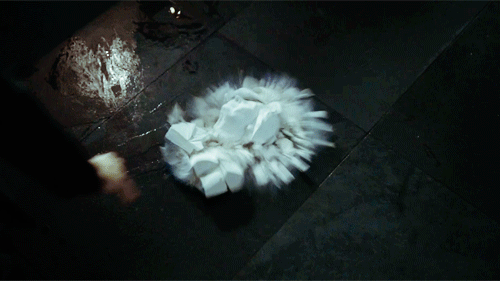
During the French Revolution, the statue of Napoleon on the column at Place Vendôme, Paris was the target of iconoclasm several times: destroyed after the Bourbon Restoration, and during the Paris Commune.
Napoleon loomed large as a political figure in the 19th century. The artists of subsequent periods were a mix of elevating his image…or smashing it. Napoleonic Iconoclasm is an actual known trope, as he evolved into a mythical figure during the Romantic Period.
“Such a fact must tell against the theory that the man who breaks them is influenced by any general hatred of Napoleon. Considering how many hundreds of statues of the great Emperor must exist in London, it is too much to suppose such a coincidence as that a promiscuous iconoclast should chance to begin upon three specimens of the same bust.“
The Adventure of The Six Napoleons touches on true political history, and the image of Napoleon intertwines with the enduring quality of Holmes. Moriarty was not called ‘The Napoleon of Crime’, for nothing. He was created as a nemesis to Holmes; his mirror image, for his eventual death. But whereas Moriarty died, Sherlock Holmes, like Napoleon, was ‘banished’, only to return, and be celebrated, while once again, taking control of ACD’s career.
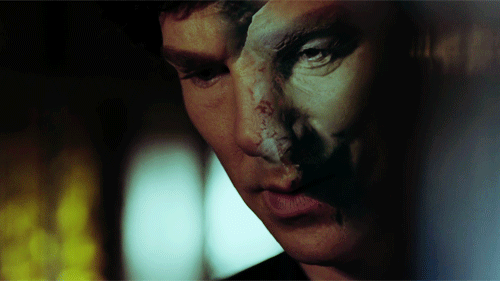
“Privately, he has become something of a villain, over time, tyrannically taking control of Doyle’s writing, and his endlessly-replicated heroic figure invited smashing.” This quote, from The Secret Marriage of Sherlock Holmes: "Shattering the pedestrian image of reason is Holmes’s great iconoclastic gift.“ "His reasoning is obsessive, impulsive, unpredictable, astonishing.” Holmes displays much enthusiasm and dramatic flair in The Six Thatchers, and “When the blow of the riding crop shatters the image so long sought, and reveals the pearl inside, all subsequent explanations seem a footnote. That blow is this story’s symbolic representation of reason’s power, and that single gesture sums up the transvaluation (re-evaluating of the values) of reason’s image that Sherlock Holmes has wrought.“ It’s part of my theory that BBC Sherlock is engaging Holmesian Iconoclasm; in a literary sense, breaking the man down to his most basic parts, taking him into dark places in an experiment of re-integration, using the teachings of Nietzsche in Season 4, as a way of aligning his moral code for the world we live in now. What ARE the sum of his parts?
The Question: Sherlock and Theseus’s Paradox by Dennis O’ Neil
"An Ancient Greek named Theseus…builds a ship. Over time the ship needs repairs and pieces of it have to be replaced and finally everything has been replaced. Not a single splinter of the original craft remains. Which brings us to what is known in some circles as Theseus’s Paradox. We ask: Is the ship our man Theseus ends with the same one that he built years earlier?”
In The Beginning: Birth & The Bi-Part Soul
Below is an excerpt from a thesis The Influence of Duality and Poe’s Notion of the Bi-Part Soul’ on the Genesis of Detective Fiction in the Nineteenth-Century by Stephanie Craighill. It is a lengthy, beautiful piece on the genesis of the creation of what we refer to as the Mirrors. Like Nietzsche, Poe and Doyle held strong belief in Duality/Dualism/Balance, and used that belief, NOT just when structuring characters, but the stories themselves.
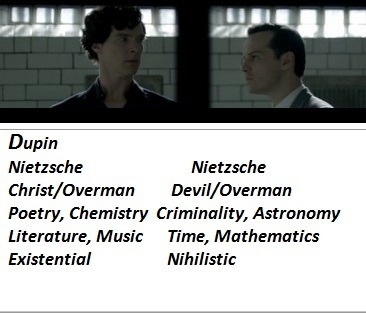
"Observing him in these moods, I often dwelt meditatively upon the old philosophy of the Bi-Part Soul and amused myself with the fancy of a double Dupin; the creative and the resolvent." Poe‘s explicit reference to the double‘ directly intertwines with the theme of duality which resonates throughout the Gothic novel and the Romantic Movement in nineteenth century fiction; this paradigm is evident in texts such as Johann Wolfgang von Goethe‘s Faust, Mary Shelley‘s Frankenstein…This motif has been extensively examined by scholars and has been defined using numerous but vague classifications which include the fictional double‘, the evil twin‘, the alter ego‘, the antithetical self‘, the fragmentation of self into dual‘ and the twin soul‘. Dupin reproaches the Prefect of the Parisian police for being too cunning to be profound‘,
(which mirrors the game of chess where what is complex is mistaken for what is profound‘. The detective, also, rebukes the Prefect‘s wisdom‘ for being all head and no body‘ which relates to the detective‘s earlier supposition that the ingenious are always fanciful, and the truly imaginative never otherwise than analytic‘ The Prefect‘s reasoning is too fanciful‘ to be successful. It is through the combined use of both aspects of the Bi Part Soul‘, the head‘ and the body‘ and their associated faculties of the imagination and reason, that the detective was able to outwit his opponent.)
Duality is implicit in the structure and characterization of The Murders in the Rue Morgue‘. It is visible in the tale‘s twin plot, the divided self which is the narrator and Dupin, the doubling of the criminals, victims and detective and most prominently the detective‘s creative and resolvent‘ Bi-Part Soul‘. Dupin‘s dual psychology is associated with moral ambiguity and a blurring of boundaries which, consequently, has shaped a compelling psychosomatic template for a genre of multifaceted and complex detective protagonists. Holmes‘ inherent dualism is summarised by Iain Sinclair and Ed Glinert who state that: Holmes is the classically divided man that the age required: alchemist and rigorous experimenter, furious walker and definitive slacker, athlete and dope fiend. He could, as the mood took him, be Trappist or motor mouth … Holmes is forever lurching between incompatible polarities. From the beginning Holmes was a double figure, first in himself as the mixture of scientist and poet and even more significantly in the double figure of Sherlock Holmes Doctor Watson‘. Conan Doyle‘s implicit doubling of Poe‘s detective trilogy extends further; like Dupin who doubles the criminals in The Murders in the Rue Morgue‘ and the thief Minister D. in The Purloined Letter‘, Holmes represents a doppelgänger for his arch nemesis, the criminal mastermind Professor Moriarty. Moriarty only directly appears in two of the sixty Holmes accounts; in the short story The Final Problem‘ and the novella The Valley of Fear, though he is mentioned in a selection of the other narratives. In these two accounts we learn that Moriarty shares a number of common characteristics with Holmes. He is of similar physical appearance, has a phenomenal mathematical faculty‘, is a genius, a philosopher, an abstract thinker‘ and a scientific criminal‘ Moriarty conforms to the same Bi-Part‘ mould as the detectives Holmes and Dupin; he is both reasoned and artistic. In The Final Problem‘ Holmes refers to Moriarty as the organiser of half that is evil. Moriarty could characterize an inversion of the values embodied by Holmes‘ and, as a result, the criminal represents the detective‘s doppelgänger who is equipped with an identical skill set but motivated by an evil purpose."
Context: Paralleling the Works of Nietzsche and Sherlock
Out of the night that covers me, Black as the pit from pole to pole, I thank whatever gods may be For my unconquerable soul.
Thus Spake Zarathustra: Sherlock On The Ocean:
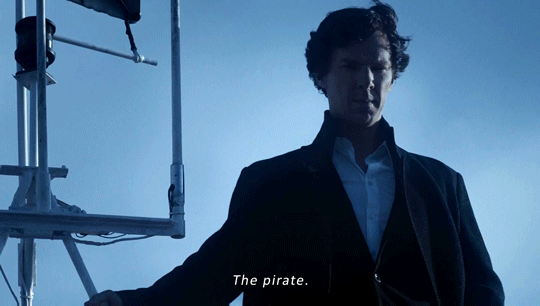
"The above piece was written in 1875 by William Ernest Henley. Perhaps most famous is Henley’s closing statement: “I am the master of my fate:/I am the captain of my soul.” The poem is a declaration of the triumph of the human spirit - the refusal to bend to a universe Henley called “a place of wrath and tears. Holmes was an unprecedented sort of hero. Emerging from a culture enthralled by scientific progress, he was a superhero who relied almost entirely on his powers of deduction…Holmes was and is the sensationalized personification of Henley’s captain of the soul. His powers of deduction are presented as the triumph of reason, a triumph open to all of humanity if we’d only try a little harder. In this way, Sherlock Holmes is Nietzsche’s “superman” (a term coined in Thus Spake Zarathustra, written a few years before A Study in Scarlet). He is the moral, observational and logical evolution of mankind.
The Übermensch is Nietzsche’s concept of the ideal, and it can translate to overman, superman, above human, and probably some other things. The Übermensch doesn’t have incredible physical abilities. Instead, his power is mental and spiritual. The greatest power in the world, according to Nietzsche, is freedom, and I’m about to make a huge and tragic over-simplification of Nietzsche’s theory as to what that means. It is that complete human freedom is achieved by radically breaking with all forms of guilt, shame, and external authority. It combines many qualities of a completely naïve and fearless toddler with those of an experienced and wise elder."
Sherlock: Isn't that...one of those Law things?
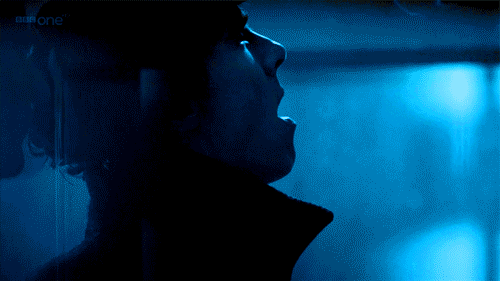
"In the first or second episode a minor character calls him a sociopath, and the show really delves into the question of what actually makes Holmes and Moriarty (a really evil criminal who is as good at crime as Holmes is at solving crimes) different from each other aside from pure occupational interests. The sociopath comment was my first clue. Critics of Nietzsche’s philosophy have always contended that his Übermensch would really be a sociopath who just looks out for number one. What is useful in making the connection between Sherlock Holmes and Nietzsche’s work is that I think the Holmes series provides a picture into how the Übermensch doesn’t necessarily play out as a sociopath.“
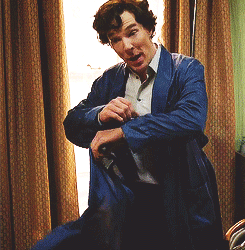
"He can’t stand the boredom of the day to day, the absurd. And it is just like any good German existentialist to value present experience over the longevity of life. Furthermore, he is completely open about his habit with Dr. Watson, who is initially very concerned. His openness about it shows that Holmes gives no credibility to prescriptions other than his own as to what constitutes a good life.
His passion happens to be for forensic science, or the “science of deduction,” as Holmes calls it. The key, though, is that he throws everything he has got into what he truly cares about, leaving no room for time wasters like social obligations, civic engagement, parties, etc. Dr. Watson even finds that Holmes isn’t aware that the Earth revolves around the sun, since it has no use for his forensic studies.”
“There is an old illusion—it is called good and evil. Around soothsayers and astrologers hath hitherto revolved the orbit of this illusion.
Once did one believe in soothsayers and astrologers; and therefore did one believe, "Everything is fate: thou shalt, for thou must!”
Then again did one distrust all soothsayers and astrologers; and therefore did one believe, “Everything is freedom: thou canst, for thou willest!”
O my brethren, concerning the stars and the future there hath hitherto been only illusion, and not knowledge; and therefore concerning good and evil there hath hitherto been only illusion and not knowledge!" Thus Spake Zarathustra
”On Nietzsche: While most of his contemporaries looked on the late nineteenth century with unbridled optimism, confident in the progress of science and the rise of the German state, Nietzsche saw his age facing a fundamental crisis in values. With the rise of science, the Christian worldview no longer held a prominent explanatory role in people’s lives, a view Nietzsche captures in the phrase “God is dead.” However, science does not introduce a new set of values to replace the Christian values it displaces. Nietzsche rightly foresaw that people need to identify some source of meaning and value in their lives, and if they could not find it in science, they would turn to aggressive nationalism and other such salves. The last thing Nietzsche would have wanted was a return to traditional Christianity, however. Instead, he sought to find a way out of nihilism through the creative and willful affirmation of life.“
The Gay Science: Nietzsche’s first consideration of the idea of the eternal recurrence
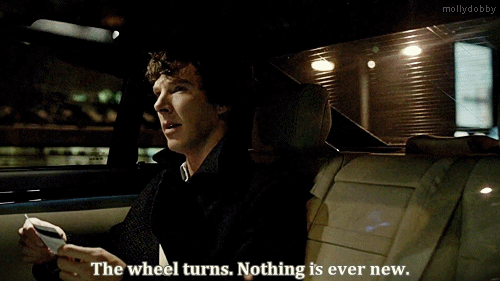
“What if some day or night a demon were to steal after you into your loneliest loneliness and say to you: ‘This life as you now live it and have lived it, you will have to live once more and innumerable times more’ […] Would you not throw yourself down and gnash your teeth and curse the demon who spoke thus? Or have you once experienced a tremendous moment when you would have answered him: 'You are a god and never have I heard anything more divine.”
This was one of the themes of Shakespeare’s No Fear Sonnets 1-60, some of which have been found embedded and acted out in the show. 59 is heavy with this theme and found in The Six Thatchers. “Not only does Nietzsche posit that the universe is recurring over infinite time and space, but that the different versions of events that have occurred in the past may at one point or another take place again, hence "all configurations that have previously existed on this earth must yet meet…” And with each version of events is hoping that some knowledge or awareness is gained to better the individual, hence “And thus it will happen one day that a man will be born again, just like me and a woman will be born, just like Mary—only that it is hoped to be that the head of this man may contain a little less foolishness…”
The Antichrist, originally published in 1895

MARY: Hm. Now you’d think we’d have noticed, when she was born. JOHN: Hm? Noticed what? MARY: The little 666 on her forehead. JOHN: Hmhmhm, that’s The Omen. MARY: (lifts her head to look at him with a frown, stays like that though John’s entire answer) So? JOHN: Well, you said it was like The Exorcist. They’re two different things. You can’t be the Devil and the Antichrist.
“Nietzsche writes scathingly about Christianity, arguing that it is fundamentally opposed to life. In Christian morality, Nietzsche sees an attempt to deny all those characteristics that he associates with healthy life. The concept of sin makes us ashamed of our instincts and our sexuality, the concept of faith discourages our curiosity and natural skepticism, and the concept of pity encourages us to value and cherish weakness. Furthermore, Christian morality is based on the promise of an afterlife, leading Christians to devalue this life in favor of the beyond. Nietzsche argues that Christianity springs from resentment for life and those who enjoy it, and it seeks to overthrow health and strength with its life-denying ethic. As such, Nietzsche considers Christianity to be the hated enemy...Christianity is called the religion of pity. Pity stands opposed to the tonic emotions which heighten our vitality: it has a depressing effect. We are deprived of strength when we feel pity. That loss of strength which suffering as such inflicts on life is still further increased and multiplied by pity. Pity makes suffering contagious."

Sherlock: This hospital is full of people dying, doctor, why don’t you go and cry by their bedsides, see what good it does.
Nietzsche claimed that the Christian religion and its morality are based on imaginary fictions. Concept of morality is falsified. Morality is no longer an expression of life and growth. Instead, morality opposes life by presenting well–being as a dangerous temptation. Priestly agitators “… interpret all good fortune as a reward, all misfortune as punishment for disobedience of God, for 'sin,’…The sacred book formulates the will of God and specifies what is to be given to the priests. Priests become parasites.”…All things of life are so ordered that the priest is everywhere indispensable; at all the natural events of life, at birth, marriage, sickness, death. Not to speak of 'sacrifice’ (meal–times)…Natural values become utterly valueless. The priest sanctifies and bestows all value. Disobedience of God (the priest) is 'sin.’ Subjection to God (the priest) is redemption. Priests use 'sin’ to gain and hold power.

Sherlock: …And contrast is, after all, God’s own plan to enhance the beauty of his creation. Or it would be if God were not a ludicrous fantasy designed to provide a career opportunity for the family idiot.
*Interesting footnote about the first part of this statement. Goethe, from whom Nietzche gets the word Ubermensch, apparently actually invented the Color Wheel. THIS video shows how he used light, shadow and a color to enhance the beauty of another.
“The Truth’s Boring!”

“Nietzsche is critical of the very idea of objective truth. That we should think there is only one right way of considering a matter is only evidence that we have become inflexible in our thinking. Such intellectual inflexibility is a symptom of saying “no” to life, a condition that Nietzsche abhors. A healthy mind is flexible and recognizes that there are many different ways of considering a matter. There is no single truth but rather many.”
“Because You’re an Idiot”
"Nietzsche thought that the word idiot best described Jesus. According to Walter Kaufmann, he might have been referring to the naïve protagonist of Dostoyevsky’s book The Idiot. “The fable of Christ as miracle–worker and redeemer is not the origin of Christianity..Jesus did not want to redeem anyone. He wanted to show how to live. His legacy was his bearing and behavior. He did not resist evildoers. He loved evildoers. Nietzsche claimed that the Christian faith as practised was not a proper representation of Jesus’ teachings, as it forced people merely to believe in the way of Jesus but not to act as Jesus did, in particular his example of refusing to judge people, something that Christians had constantly done the opposite of."
Human, All Too Human: On Becoming
JOHN: Don’t pretend you’re not enjoying this. SHERLOCK (not looking round): Hmm? JOHN: Being back. Being a hero again. SHERLOCK: Oh, don’t be stupid. JOHN: You’d have to be an idiot not to see it. You love it. SHERLOCK (turning to face him): Love what? JOHN: Being Sherlock Holmes. SHERLOCK: I don’t even know what that’s supposed to mean.

"Nietzsche wrote that Heraclitus "will remain eternally right with his assertion that being is an empty fiction”. Nietzsche developed the vision of a chaotic world in perpetual change and becoming. The state of becoming does not produce fixed entities, such as being, subject, object, substance, thing. Ephesus, who in the sixth century BC, said that nothing in this world is constant except change and becoming." Sherlock, at this point, is still in a state of becoming.
"Reptile!"
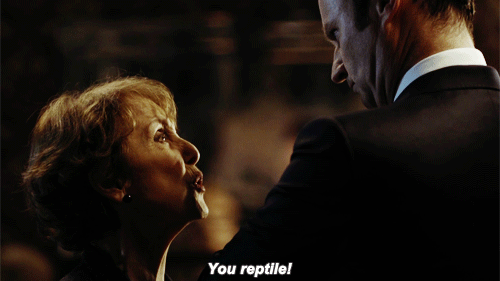
"But wherever ye would ascend with me, O my brethren, take care lest a parasite ascend with you! A parasite: that is a reptile, a creeping, cringing reptile, that trieth to fatten on your infirm and sore places. And this is its art: it divineth where ascending souls are weary, in your trouble and dejection, in your sensitive modesty, doth it build its loathsome nest.”
“Enemy” shall ye say but not “villain,” “invalid” shall ye say but not “wretch,” “fool” shall ye say but not “sinner.”
And thou, red judge, if thou would say audibly all thou hast done in thought, then would every one cry: “Away with the nastiness and the virulent reptile!” Thus Spake Zarathustra
Why All The Pain? The Birth of Tragedy
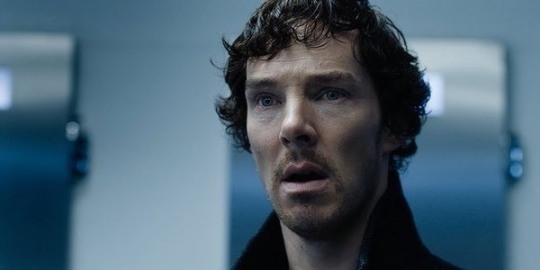
“Artistic creation depends on a tension between two opposing forces, which Nietzsche terms the “Apollonian” and the “Dionysian.”
"Apollo was the god of light, reason, harmony, balance and prophesy, while Dionysus was the god of wine, revelry, ecstatic emotion and tragedy.
Nietzsche uses this duality for discussing the artistic process which relate to either Apollo or Dionysus. Apollo and Dionysus symbols of this duality which he further distinguishes with the terms of “dreams” and “drunkenness.” For Nietzsche, dreams represent the realm of beautiful forms and symbols, an orderly place of light and reason. Drunkenness, on the other hand, is that state of wild passions where the boundaries between "self" and "other" dissolve. (This may strike as odd, but Nietzsche seems to make the assumption that, when dreaming, one is aware of the fact that one is dreaming and so still able to separate appearance from reality. I believe that he would claim those who are entirely caught up in their dreams are experiencing Dionysian ecstasy, not Apollonian beauty.)"
Meet Nihilism
”The nihilist believes in nothing, has no loyalties and has no purpose in life. Some are left with only an impulse to destroy.“
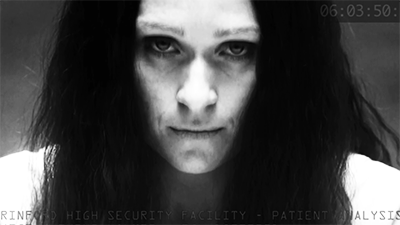
EURUS: Am I being punished? MAN (offscreen, faintly): You’ve been bad. EURUS (almost sing-song): There’s no such thing as ‘bad.’ MAN (offscreen): What about good? EURUS: Good and bad are fairytales. We have evolved to attach an emotional significance to what is nothing more than the survival strategy of the pack animal. We are conditioned to invest divinity in utility. Good isn’t really good, evil isn’t really wrong, and bottoms aren’t really pretty. You are a prisoner of your own meat. MAN (offscreen): Why aren’t you? EURUS (raising her head and looking directly into the camera as she speaks the words slowly and clearly): I’m too clever.
"Moral nihilism, also known as ethical nihilism, is the meta-ethical view that morality does not exist as something inherent to objective reality; therefore no action is necessarily preferable to any other. For example, a moral nihilist would say that killing someone, for whatever reason, is not inherently right or wrong. Nietzsche characterized nihilism as emptying the world and especially human existence of meaning, purpose, comprehensible truth, or essential value."
Eurus is most definitely a Sherlock mirror; a Bi-Part Soul. She doesn’t even know 'if something’s beautiful or not; only right’. Eurus is pure Nihilism. A Brain without a heart; an actual calculating machine, attempting to show that making a supposed 'morally-right decision can actually create the opposite result, so that moral codes don’t matter. She used tests, like sherlocks-paradox, tests he has been put through before. As we witness, Sherlock succeeds.
This is still the same journey many have pointed out, just using the Nietzschean Method to do so. Growing from a great man…a Superman into a good one; flawed and very much human, with a Moral Code to match.
"Friedrich Nietzsche believed that the corrosive effects of nihilism would end up destroying all moral constructs, religions, and metaphysical convictions...that nihilism would be the most corrosive force in history.”
Fun Note: On Mustaches & Military Kinks
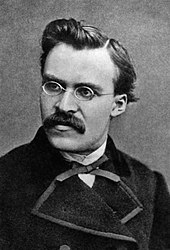
“Nietzsche lived with the mustache most of his adult life, and it represented for him the military life. He served briefly in the military, and always held certain admiration for military discipline. In him we get a sense that the military attitude is very important towards living a proper, fulfilling life. If you ask most people what does Nietzsche look like, what they will immediately say is: ‘oh that’s the guy with the huge mustache’. And if you ask: ‘well, what about the eyes? the nose? what about the chin? what about the hair?’ They will probably draw a blank. And Nietzsche himself points out that when you see someone with a big handsome mustache, what they see is: the mustache. It is a mask, it allowed Nietzsche in effect to hide.”
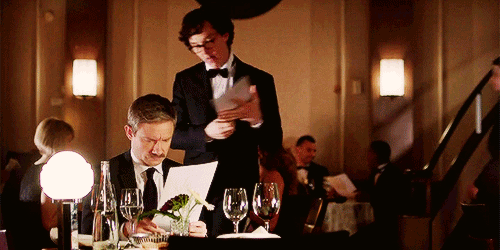
To conclude, through the eyes of Nietzsche, the show is smashing the previous images of Sherlock Holmes, using the Philosopher’s works, in addition to Freud and Josef Breuer, to take him through a journey of self-discovery, and yes, love. Given the strong hints to a troubled childhood and suppression of feelings, the philosophies of these men, together, are employed, just as presented in When Nietzsche Wept. This meta cannot even begin to cover the full scope of Nietzshe’s works or his strong influence on the blueprint of Sherlock Holmes. His presence is found throughout canon; sometimes, in the form of other characters. I will say that Nietzche’s ideas are many, profound and important. Considering his influence on Arthur Conan Doyle, and Sherlock Holmes, who has in turn, been so important to 21st century, in many fields, Friedrich Nietzsche should always be held in high regard. Not bad for a guy who in the good old days would have been labelled a Heretic, and burned at the stake. So maybe he’s right; we can be better.
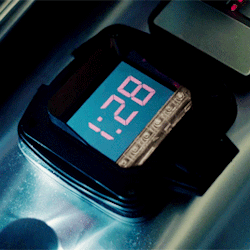
“I know my fate. One day my name will be associated with the memory of something tremendous — a crisis without equal on earth, the most profound collision of conscience, a decision that was conjured up against everything that had been believed, demanded, hallowed so far. I am no man, I am dynamite. Ecco Homo
(Don’t you just love some of his book titles?)
Read also the-reptile-in-221b & sherlock-denying-the-devil
@brilliantorinsane @simpleanddestructivechemistry @shylockgnomes @possiblyimbiassed @raggedyblue @rinkagaminesstuff @artfulkindoforder @radogost @asherlockstudy @fellshish @multivariate-madness @madzither @yorkiepug @loveismyrevolution @consultingidiots @tjlcisthenewsexy
Full text of Thus Spake Zarathustra
X X X X X X X X X X X
#Napoleon Nietzsche & TFP Meta#Threads#1895#The Ubermensche#Josef Breuer#Freud#Nietzsche/Sherlock Parallels#Holmesian Iconoclasm#I'm Done!
71 notes
·
View notes